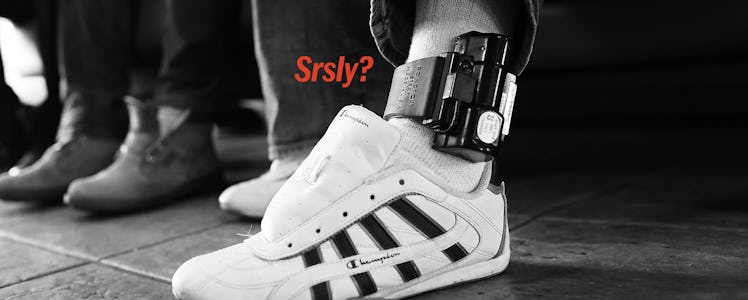Parents Using Ankle Monitors to Track Misbehaving Kids Need to Calm Down
ome companies are marketing ankle monitors to parents who want to keep track of kids, but just because they don’t require a court order does not mean it’s a good parenting tactic.

A company called Tampa Bay Monitoring has begun marketing law-enforcement style ankle monitors to parents who want to keep an eye on older children. The company, which touts the fact court orders are not necessary to attach irremovable equipment to a child, has apparently found an audience among parents concerned about delinquent children. “We provide a bracelet that is near-impossible to cut off,” owner Frank Kopczynski told Quartz. “It also allows us to have two-way communication and gives us the option of sounding a piercing alarm.”
Good lord.
Having the legal right and technological ability to monitor poorly behaved children does not make it a good idea. And let’s be clear, putting an ankle monitor on a kid is a no-good, terrible, shitty idea. Parents who opt for this extreme measure are not just being assholes, but working against their best interests. Not only will constant surveillance erode trust, but it will also likely destroy any hope for having a good relationship.
Of course, a parent who has reached the point of wanting to strap an ankle monitor to their “non-offending teen” as Tampa Bay Monitoring calls them, is probably already on the other side of some bad parenting decisions. After all, treating a child like a literal criminal is an act of desperation. Does that desperation come from a sense of love and an abiding commitment to keep a child safe? Sure. Maybe. But locking a child in an open air prison taps into the worst and oldest disciplinary method: exerting complete control. So much for empathy.
Yeah, an ankle monitor might work to keep a kid frightened and ashamed enough to stay close to home. They might even decide to rehabilitate themselves, or at least appear to. But in the long run, parents will have only succeeded in eroding a relationship that should have been built on mutual understanding.
Attaching an ankle monitor is pretty much the perfect example of what is known as authoritarian parenting, one of the three main parenting styles laid out by lauded developmental psychologist Diana Baumrind. She and colleagues who later built on her research found that parents who are harsh with discipline and restrictions have children who seem obedient in the short term but experience big issues later in life. Children of authoritarian parents often suffer from depression and low self-esteem long into adulthood and are more prone to drug abuse and suicide.
It’s very clear: By attempting to protect children, parents who exert extreme levels of control are harming them.
What’s better than an ankle monitor? Honestly, just about anything. A hug? Sure. A stern talking to? Absolutely. A used Camaro? Not a great choice, but probably. Still, the best thing is limits. Kids need them. Kids do best when they understand that those rules are connected to values and those values are not only told to them but lived by their parents. Trust breeds trust. Respect breeds respect.
For parents strapping an ankle monitor onto their child, that ship has likely sailed. But there’s always a chance they can turn things around. It’s never too late to just talk to your kid like a real person. Unless, of course, they’ve abandoned you because you’re a terrible parent.
This article was originally published on